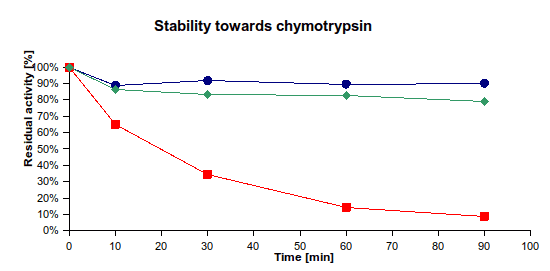PEGylation is an effective method for optimizing biopharmaceutical drugs. The coupling of biomolecules with PEGs results in considerably greater protease stability, a significant decrease in immunogenicity and a perceptible delaying of renal excretion. To address the different needs of our customers, we offer tailored PEGylation services (see bioconjugation section) and novel monodispersed branched PEGs with decreased viscosity for advanced PEGylation applications. This system is called celaSYS.

(A) Monodispersed PEG resulting in one single signal
(B) Polydispersed PEG reagents are inhomogeneous even with a PDI of 1.01
The celaSYS product line is based on a core branching unit to which several mPEG chains are attached. The chain lengths are selected according to technical needs. Whereas in traditional PEGylation, large PEG chains are attached to the drug molecule that may cause solubility and viscosity issues, the branched PEG structures of celaSYS increase solubility and decrease viscosity, while maintaining the protective effects against proteases and antibody clearance.

The stability of L-asparaginase towards chymotrypsin is significantly increased by PEGylation with celaSYS. As a control for enzyme activity native L-asparaginase was incubated without chymotrypsin.

For the use of celaSYS, see: T. Ebensen et al., J. Immunology 2007, 179, 2065 and T. Haberberger et al., US 2009/0023634.
The unique properties of celares’ branched celaSYS-reagents are summarized in the following table.
Contact partner

Dr. Sophie Janke
Head of Synthesis
+49 30 9489 2350
